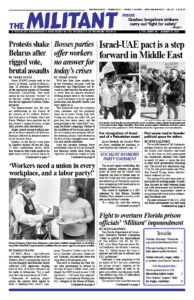The establishment of full diplomatic relations between the governments of the United Arab Emirates and Israel — the first time an Arab government has normalized relations with Israel in nearly 26 years — opens the door to other Arab governments following suit. The accord was announced Aug. 13 by the two governments and President Donald Trump, whose administration brokered the deal.
The signing of the pact opens new opportunities for working people. It underlines the need for talks between Israeli and Arab governments and leaderships of Palestinian organizations aimed at recognizing both Israel and an independent Palestinian state.
The joint statement by the U.S., UAE and Israeli governments says that Israel will “suspend” any attempts to annex parts of the West Bank Palestinian territory. Direct phone links were put in place just days later. Officials will soon meet to establish direct flights between the two countries as well as reciprocal embassies.
At a press briefing Trump noted that “this deal will allow much greater access to Muslims from throughout the world to visit the many historic sites in Israel” and to “peacefully pray at the Al-Aqsa Mosque” in Jerusalem, which is one of the holiest sites in Islam.
For years there have been increasing trade and behind-the-scenes diplomatic relations between the Israeli government and those in the UAE, Bahrain, Oman, Qatar and Saudi Arabia, as well as other Sunni Muslim-led capitalist countries.
The governments of Bahrain, Oman, and Egypt welcomed the accord. While the Saudi government has been silent, it has been increasing its ties to Israel.
Accord also aimed at Tehran
These ties have been growing because of a shared interest in defending themselves against the expanding military and political influence of the capitalist, Shiite cleric-led regime in Iran. Tehran is the main competitor of these Sunni-based regimes for economic, military and political influence in the region and a bitter foe of the Israeli state.
Even many of Trump’s liberal opponents, including Democratic Party presidential candidate Joe Biden, backed the accord. Never Trumper Thomas Friedman wrote in the New York Times Aug. 13 that “it was Trump’s peace plan drawn up by Jared Kushner and their willingness to stick with it, that actually created the raw material for this breakthrough.”
Friedman was referring to a plan by the White House and Israeli Prime Minister Benjamin Netanyahu in January that called for Palestinian recognition of Israel and Israeli recognition of a Palestinian state.
Palestinian Authority President Mahmoud Abbas rejected that out of hand, refusing to even read it.
The Israeli paper Haaretz said the latest accord can be “part of a much wider geopolitical realignment” than the previous decisions of the Israeli and Jordanian governments to establish relations in 1994 and the 1979 Egypt-Israel accord.
In a televised speech Aug. 15 Iranian President Hassan Rouhani berated the UAE rulers for their “treacherous act.” The UAE is one of Iran’s top three trading partners. On its front page, the Iranian government-backed daily Kayhan threatened the UAE, calling it “a ‘legitimate and easy target’ for the resistance.”
The next day the Gulf Cooperation Council — comprised of Bahrain, Kuwait, Oman, Qatar, Saudi Arabia and the UAE — condemned Tehran’s threats.
Abbas and Ismail Haniyeh, head of Hamas, which rules the Gaza Strip, spoke by phone. Hamas stated both officials say the accord should “not be respected.” The Turkish government also condemned it.
For years the Palestinian leadership has acted in ways that dealt blows to the Palestinian people’s aspirations to establish their own homeland. The Palestinian Authority has done nothing to advance the interests of Palestinian workers and farmers, while enriching a handful of capitalist families from massive funds doled out to it by Israel, U.N. agencies and imperialist financial institutions.
Recurring deadly conflicts between Hamas, and other groups in Gaza claiming to speak for the Palestinians, and Israel are an obstacle to Jewish, Palestinian and other working people. It makes it more difficult for working people to recognize their common class interests and act together to advance them.
As more Arab states establish relations with Israel, pressure will grow on the leadership of the main Palestinian organizations to recognize Israel alongside an independent, contiguous Palestinian state.
Al Jazeera, a news site funded by the Qatari government, ran a headline Aug. 14 alleging “Palestinians unanimously reject UAE-Israel deal.” But that is true only for the leaders of Hamas in Gaza and the Palestinian National Authority in the West Bank. So far there’s no widespread public opposition to the deal among Palestinians there or in Israel.
Talks must recognize right of Jews to take refuge
Despite the hostility of Palestinian leaders to the accord, its signing adds to the prospects of broader talks aimed at securing recognition of Israel and a Palestinian state that includes both Gaza and the West Bank.
“Negotiations to reach such an agreement must recognize the right of Jews everywhere to take refuge in Israel in face of the global rise of Jew-hatred and anti-Semitic violence, as well as the unconditional right of the dispossessed Palestinian people to a contiguous, sovereign homeland on territory — including East Jerusalem — conquered and occupied by the Israeli government during the 1967 war,” noted a statement released by Jack Barnes, Socialist Workers Party national secretary, in December 2017.
“It is along this road that working people of all national backgrounds, religious beliefs and political allegiances in Israel and Palestine can use and defend their space to speak, organize and begin redressing the blood-drenched legacy of imperialist domination and capitalist exploitation,” the SWP statement said.


